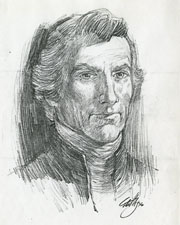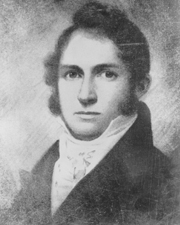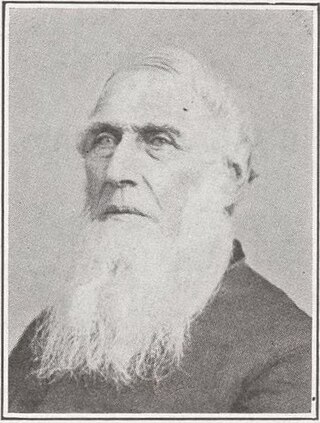Related Research Articles

Ninian Edwards was an American political figure who was prominent in Illinois. He served as the first and only governor of the Illinois Territory from 1809 to until the territory earned statehood in 1818. He was then one of the first two United States senators from the State of Illinois from 1818 to 1824, and the third Governor of Illinois from 1826 to 1830. In a time and place where personal coalitions were more influential than parties, Edwards led one of the two main factions in frontier Illinois politics.

John Williams Walker was an American politician, who served as the Democratic-Republican United States senator from the state of Alabama, the first senator elected by that state.

The Illinois General Assembly is the legislature of the U.S. state of Illinois. It has two chambers, the Illinois House of Representatives and the Illinois Senate. The General Assembly was created by the first state constitution adopted in 1818. As of 2023, the current General Assembly is the 103rd; the term of an assembly lasts two years.

The Illinois House of Representatives is the lower house of the Illinois General Assembly. The body was created by the first Illinois Constitution adopted in 1818. The House under the current constitution as amended in 1980 consists of 118 representatives elected from individual legislative districts for two-year terms with no limits; redistricted every 10 years, based on the 2010 U.S. census each representative represents approximately 108,734 people.

John McLean was a United States representative and a Senator from Illinois. He was the brother of Finis McLean and uncle of James David Walker.

John M. Reynolds was an American lawyer and politician from the state of Illinois who served in all three governmental branches.

Daniel Pope Cook was a politician, lawyer and newspaper publisher from the U.S. state of Illinois. An anti-slavery advocate, he was the state's first attorney general, and then became a congressman. He is the namesake of Cook County, Illinois.

Solomon Porcius Sharp was an American lawyer and politician, serving as attorney general of Kentucky and a member of the United States Congress and the Kentucky General Assembly. His murder by Jereboam O. Beauchamp in 1825 is referred to as the Beauchamp–Sharp Tragedy or "The Kentucky Tragedy."

Martin D. Hardin was a politician and lawyer from Kentucky. Born in Pennsylvania, his family immigrated to Kentucky when he was still young. He studied law under George Nicholas and commenced practice at Richmond, Kentucky. His cousin, future U.S. Representative Benjamin Hardin, studied in his law office. He represented Madison County in the Kentucky House of Representatives for a single term.

Erastus Root was an American lawyer and politician from New York. He is most notable for serving four separate non-consecutive terms in the U.S. House of Representatives in the early 19th century.

Philo Case Fuller was an American lawyer and politician.
The following table indicates the party of elected officials in the U.S. state of Connecticut:

The 1825/1826 United States Senate election in New York was held on February 1, 1825, and January 14, 1826, by the New York State Legislature to elect a U.S. Senator to represent the State of New York in the United States Senate.

David Higgins was a politician and judge from the U.S. State of Ohio. He was the Speaker of the Ohio House of Representatives 1826 to 1827.

The 4th Illinois General Assembly, consisting of the Illinois Senate and the Illinois House of Representatives, met from November 15, 1824, to January 18, 1825, and again from January 2, 1826, to January 18, 1826, at The Vandalia State House. The apportionment of seats in the House of Representatives was based on the provisions of the First Illinois Constitution. Political parties were not established in the State at the time.
William Kinney was an American pioneer, politician, and merchant who was the third Lieutenant Governor of Illinois. Born in Kentucky, Kinney came to the Illinois Territory at a young age with his family. In 1809, he founded a successful dry goods store on the road between the towns of Belleville and Lebanon. This made him a prominent citizen of St. Clair County, and Kinney was elected to the Illinois Senate when the body was formed in 1818.

George Cadwell was an American pioneer, politician, and physician from Connecticut. After Cadwell studied medicine in Vermont, he married a daughter of Matthew Lyon. He left with Lyon to Kentucky, but then settled in the Indiana Territory after a dispute about slavery. He served in the government of Madison County, then was elected to the Illinois Senate when the state was founded in 1818. He served three two-year terms, then resumed the practice of medicine.
William Robert Blair II was an American politician, lawyer, and businessman.
William Melville Alexander was an American politician, physician, and land speculator active in Illinois.
Thomas Mather (1795-1853) was an American politician in Illinois who served in the Illinois House of Representatives and the Illinois Senate.
References
- 1 2 3 Redmond, Mary (1980). Mr. Speaker: Presiding Officers of the Illinois House of Representatives 1818-1980. Office of the Speaker of the House. p. 9. Retrieved September 8, 2022.
- 1 2 Emmerson, Louis L., ed. (1919). "Members of General Assembly 1818 to 1920 Inclusive". Illinois Blue Book 1919-1920. State of Illinois. p. 525. Retrieved September 12, 2022.

